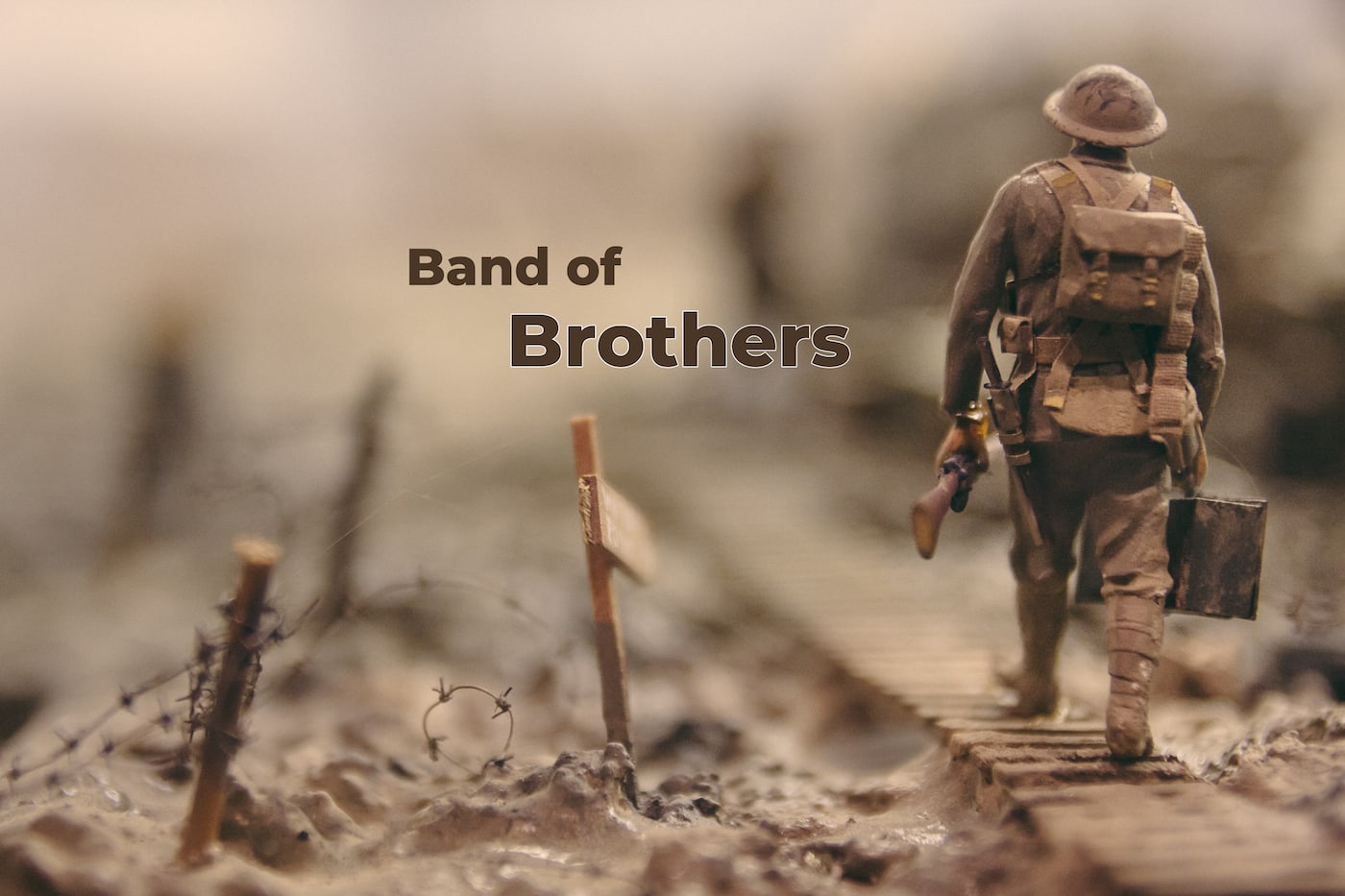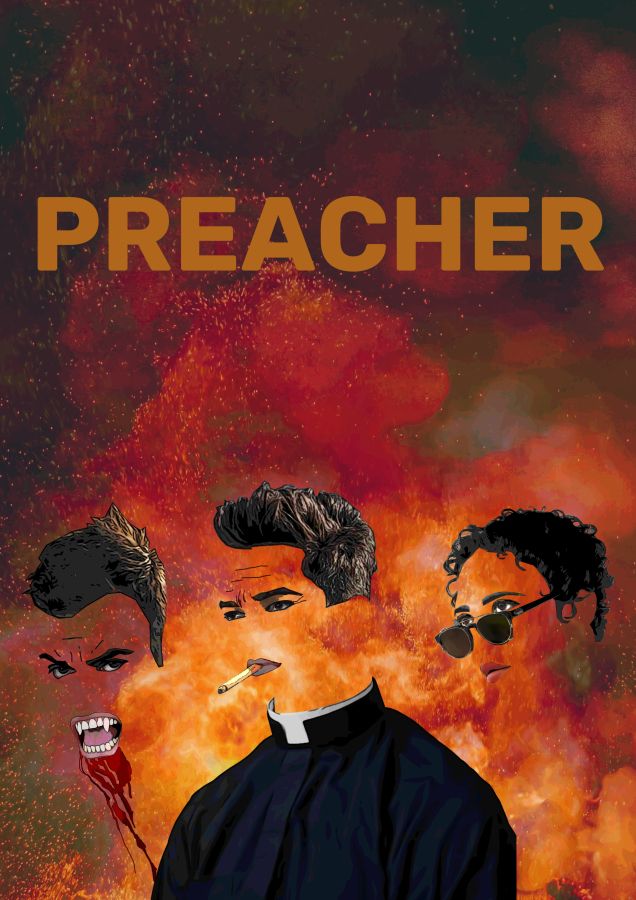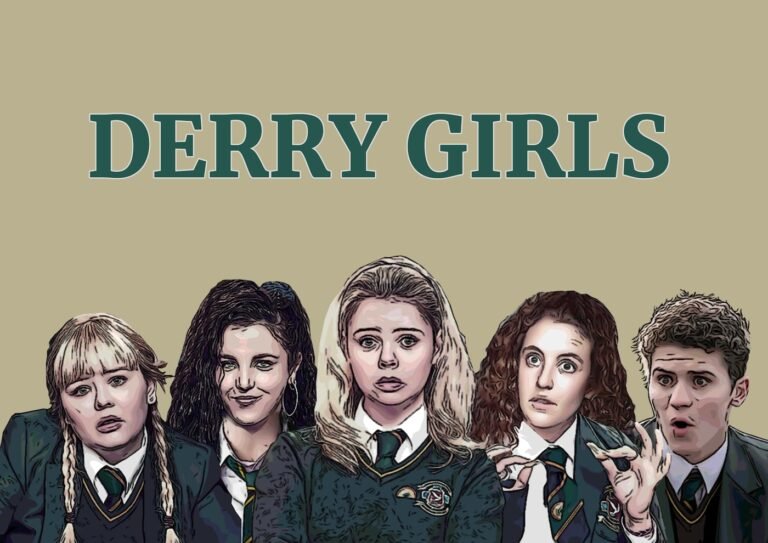Stirringly sad, the opening music epitomises the show’s themes; hope, loss and a sense of the heroics as the series has you bear witness to its true stories. This mini-series of ten episodes, produced by Tom Hanks and Steven Spielberg, gives voice to the trials of “E” Easy Company (a regiment of the 101st Airborne Division) in World War II. Each episode of Band of Brothers is based on the interviews of those who were there, along with extracts from the soldiers’ lives in the war. Emphasising these real-life experiences, the soldiers, now in the later years of life, introduce each up-coming episode; explaining the situation shown, how they felt at the time, and a little bit about what’s to occur, culminating with the show’s narrative of a family forged in the extremes of life, their stories beautifully told.
The first episode starts with a collection of sombre faces as they look onto the starting of a movie, their minds elsewhere as they count down the hours to their deployment. For they know they’re not living in a make-believe world of storytelling, but one of harsh truths; where they won’t all get to live their happy ending – the series making the contrast between fiction and reality. From this the film goes back two years to 1942 and to the start of their army training.
It’s here we’re introduced to Herbert M. Sobel (played by David Schwimmer), his overbearingly strict commandment done for the prestige of success rather than for his men; refusing to allow them to help even each other, seeing it only as a weakness. He’s determined to break their spirit, not knowing that together they’re stronger – a point the series makes –which is understood by the unit’s second in command; Richard D. Winters played by Damian Lewis, who motivates and supports them with every ounce of his being. Both actors are fantastic in the role; with Sobel being a character you love to loathe, while Winters comes to represent an ideal commander – his tough, loyal, smart and won’t ask anyone to do something he wouldn’t.
In producing Band of Brothers, not only was it one of the most expensive TV shows to date, but it also went to great lengths to have as much historical accuracy as possible, from interviews, source material and in having the actors contact those they were due to portray – and it really comes through, the characters having a sense of being pulled from time, and not just merely a reconstruction, with the casting also carefully choosing actors who were close to the soldiers’ appearance. They also went through an intense ten-day boot camp in which they were taught weapons-handling and other skills that would have been needed in the war, and thereby creating a comradery between them.
But as said the show isn’t good-times, glitz and glamour, and even in the training this is made apparent; with meat and intestines hanging from the barbed wire they’re crawling under – forcing us to confront a sickening reality of what they’ll face. But it also degrades those who will die and have already died by this hanging of butchers’ meat. It stays in the mind and for both the right and wrong reasons – death being treated as an everyday occurrence, one that’s dehumanised. Yet in their reactions, and the strong bonds they form, shows a very personalised cost of war and the very real horror of it.
Intentionally keeping the gritty tones, the show avoids bright colours; muting it down to be in line with the difficult experiences of war – with greys and browns being most prominent. But when there is an explosion of colour it’s either gunfire against the sky, explosions, or a pool of blood that’s nonchalantly driven through – its placement against a plain backdrop making it scream all the louder. Another contrast is the idyllic shots of the countryside, to the sharp inclusion of weapons and the men that wielded them – their bodies lying between the branches and flowering fields. The juxtaposition of what’s natural to what’s not, being abundantly clear.
Filmed decades ago Band of Brothers hasn’t aged in any way, its portrayal being just as heart-wrenching, although the CGI is noticeably poorer when compared to today’s standards, but its passable, while the special effects department have created an atmosphere that makes you visibly flinch at every bang. Add to this the inclusion of hand-held camera shots – for those moments of running into battle – and you get an all too real sense of being there.
Surprisingly in this unflinchingly-told tale of war there are lines of humour; providing the audience a break from the constant upheaval of its characters, while adding to the comradery that increasingly builds between them, making them (along with their trials and sacrifices) a family, or more exactly brothers.
Band of Brothers is realistically set, the loss incalculable and in following Easy Company in their day-to-day activities – an insightful voice has been ensured in accurately portraying those who fought.
Series Writer: Stephen Ambrose
Based on the 1992 non-fiction book Band of Brothers by Stephen Ambrose










